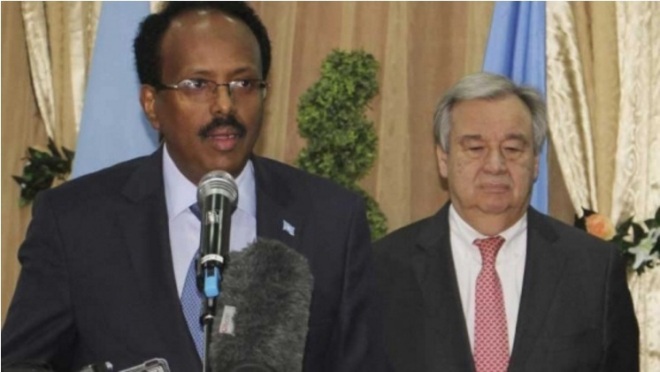
Last week an international conference on Somalia was organised and hosted by the British government and co-chaired by the UN Secretary General Antonio Guterres. This is the third major international conference of its kind since 2012.
One thing is clear; the international community has finally started paying attention to Somalia. Since the fall of the government of Mohamed Siad Barre 26 years ago, our neighbour to the east has had more than its fair share of turmoil, conflict, famine and breakdown of all kinds of imaginable social order.
For more than 20 years the international community simply refused to organise any meaningful dialogue in Somalia.
That is why the last three major international conferences are a welcome change. In last week’s conference world powers agreed on plans to support and train Somalia’s army and police to take over duties currently performed by the African Union.
The presence of foreign troops might have been helpful in the beginning, but now the AMISOM forces have outlived their usefulness. What Somalia needs its own well equipped national army. Outwardly deceptive When Mohamed Abdullahi Mohamed (Farmajo) was elected president in February, a sense of hope engulfed the people of Somalia.
There was jubilation and ululation around the globe especially by people of Somali decent. Why did the election of their President excite the Somalis this time around? Having met President Farmajo last month in Kenya, he doesn’t really comes across as overtly charismatic.
When he gave his speech over dinner at a Nairobi hotel to a group of local Somali leaders and the business community, my attention drifted away shortly after he begun.
His speech lacked the gravitas of a man given the task of lifting a country out of the pit. Yet all Somalis, including myself, have developed a sense of hope through him.
The big question is; why this man and what is so special about him? Is he being guided by God? Remember even in Biblical times, vision and leadership was considered a God-given gift. God gave leadership to various individuals even when they lacked vital skills like in the case of Moses , he was appointed to lead the Israelites out of Egypt. But Moses was deficient in speech.
He stammered and could hardly communicate to his followers, yet speech was a vital for his followers to understand what he was saying. Probably, Farmajo could be the Moses people of Somalia were hoping to get.
The reason why President Farmajo reawakened hope for Somalia can be found in his tenure as a Prime minister of Somalia. As PM, he attempted to set up a strong national defence force and promote law enforcement. He also fought the Al Shabaab militia and took the war to their door steps.
The then Prime Minister Farmajo also demanded the reduction of AMISOM troops and built the institutions in Somalia. Not everyone was happy about that.
The removal of Farmajo as PM was engineered by cartels that prefer anarchy in Somalia. The hand of a neighbouring north country was clear. Back to the London conference, British Prime Minister Theresa May pledged a four-year support.
First is to establish and strengthen a strong national army; second is to revise the constitution so that the locals can vote their leaders instead of using clan-based Electoral College. Lastly, develop capacity for the country to manage its affairs and reduce corruption. For this, the United Nations appealed for $1.5 billion as aid to Somalia.
The worry for many analysts is that no stock-taking has taken place of earlier pledges and whether there was any progress. The first Somalia conference in 2012 was christened the ‘new dawn’ 5 years later the new dawn does not seem to have produced the desired results.
If the conference in London last week does not give the desired output, then support from the international community might waver. But giving aid to Somalia alone is not enough. Somalia has more than enough resources to feed and protect its people and generate the revenue required by the federal and regional governments. So yes, give more aid, but ultimately it is the people of Somalia who will decide the future of their country.
![]()
























![New PM Starmer names first cabinet after landslide win British Prime Minister Keir Starmer looks on, at Number 10 Downing Street, following the results of the election, in London, UK, July 5, 2024 [Kevin Coombs/Reuters]](https://i0.wp.com/www.horndiplomat.com/wp-content/uploads/2024/07/2024-07-05T115520Z_52034812_RC2ZO8AP0G9J_RTRMADP_3_BRITAIN-ELECTION-1720202222.webp?resize=100%2C70&ssl=1)








